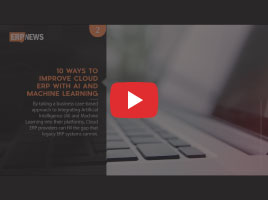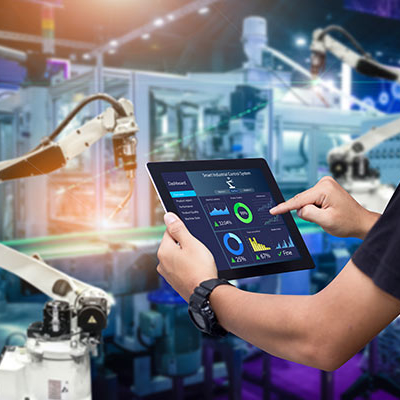
Mobile ERP helps maximize employee productivity. Your people have places to go and important people (your customers, your suppliers, etc.) with whom to build business relationships. Being tethered to a desk with a workstation on top can also serve as a proverbial ball and chain, restricting not just digital mobility but human mobility too. When your employees have to go back to their workstations to enter data, they can end up feeling stuck, unable to work at their best, unable to see the people they need to see. Think about this issue at an organizational level, and the feeling of being slowed down and frozen in place is even greater.

For example, performing cycle counts requires managers to print out work orders or checklists. From there, employees need to manually complete them while carrying around a clipboard and pen. Once all of that is handled, workers then go back to their desks to re-enter data in the ERP. It’s a multi-step and highly-manual process that’s the epitome of inefficiency. So a cycle check completed at 9:30 in the morning doesn’t get logged until the early afternoon when the worker goes back to their desk to log in and input the relevant data. It’s a frustrating process for the worker and even worse for managers, who are left without any accurate visibility of inventory levels for hours on end. Does this stop-and-start, walk-around and then, after several hours of work, record the work when you finally get “re-chained” to your desk/workstation sound efficient? Guess what? Every single one of your employees will perform this inefficient, manual, and time-consuming process with one thought in mind: “why don’t we use a mobile app for this?”
Now consider a hapless sales rep who can only access relevant data from your CRM system through her desktop. What happens if that sales rep has to actually (gasp!) visit an existing client or a prospective client who is an hour (or a continent) away. The sales rep is tied to a ball and chain, meaning her desktop computer. But can she carry her ball and chain into a meeting with a client? Not without losing a ton of credibility with the client. No self-respecting sales rep wants to tell a client that “important information can’t be accessed” in real-time and must await the rep’s return to the office. This inefficiency and lack of data mobility can kill a deal in the middle of negotiations, as exasperated prospects lose patience (asking, “is your company stuck in 1994?”). Existing clients will be equally unhappy. Sales people need to be mobile, and their customer-related data needs to be just as mobile: customers expect it.
You business can’t tolerate these types of delays and rampant inefficiencies. You can lose customers and employees, who get tired of rolling their eyes at your inefficiencies. Too many technologies are dependent on near real-time data integration, and decision makers need immediate access to data to identify problems before they escalate. Keeping up with the growing business demands for agility, especially related to data, requires mobile ERP access. If your business is facing the problem of workers carrying around a ball and chain, i.e., the need to return to their desks to input important data, then you have a big problem: abas ERP offers a solution.
Unchain Productivity with Mobile ERP
We just laid out how a lack of mobile data and application access can impact key areas in your supply chain and your sales, but the issues also extend into just about every other department of your company. Take marketing, for example. A marketer in the field will need CRM access as she travels to attend a trade show where you’re launching your latest product. Traditionally, a marketing employee at a trade show would gather business cards by making introductions throughout the day. Then, when the event wrapped up, she would try to follow up with prospects once everybody is back at the office striving to catch up on the work they missed. With a mobile ERP system, that marketer can immediately log the interaction with the prospect into the CRM. She could also email brochures and similar materials to the individual directly. No lost cards or hit-or-miss follow-up at a time that’s inconvenient both for the marketer and the prospect (i.e., while catching up on work that’s accumulated when they were away at the trade show).
These types of rapid relational operations are increasingly the expectation, and allowing follow-up to fall through the cracks means that revenue growth is also falling through the cracks. To remedy this problem, organizations need ERP systems that allow for simple, intuitive mobile device use to capture data like business cards. At abas, we’ve built our mobile ERP solution from the ground up for ease of use across a variety of platforms.
Making mobile ERP easy
Moving to mobile ERP doesn’t need to be complex. In fact, because employees are so familiar with mobile devices in their daily lives, training for mobile is often one of the easiest parts of ERP. Some of the benefits of abas mobile ERP’s apps include:
- Allow for offline use, including data entry
- Offers a full range of apps, including inventory, production, CRM and service
- Provides the same core functionality across all formats so users don’t have to learn new interfaces depending on device type
- Features cross-platform iOS and Android support to ensure optimal performance
- Includes a web-based user interface so individuals can access systems from any internet-connected device.
The abas ERP platform is built for full accessibility across a variety of device and interface types, taking what may seem like a complex transition to mobility and making it simple. The important point to remember is that you can’t afford to have your people, the people who drive your business growth in so many business areas from production to marketing, chained to a desktop. Cut the ball and chain and provide them easy and secure mobile access to the data they need to make value-adding decisions for your business. Mobility matters, and wherever your people go, your data should also go.






















